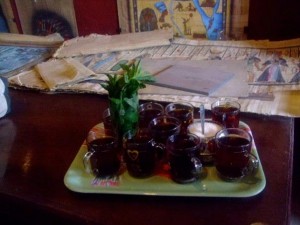Changing Landscapes
By Rachel Revelle
 Last week Kenan’s DukeImmerse: Uprooted/Rerouted students went abroad for a month of field research with Iraqi refugees in Egypt and Bhutanese refugees in Nepal. This article on the Kenan website gives an overview of their work so far and activities going forward.
Last week Kenan’s DukeImmerse: Uprooted/Rerouted students went abroad for a month of field research with Iraqi refugees in Egypt and Bhutanese refugees in Nepal. This article on the Kenan website gives an overview of their work so far and activities going forward.
A year ago I was preparing to make the trip to Egypt, as I was able to join the research team for two of their four weeks in Cairo. I’ve been reviewing my journal and reflecting back on memories. This was certainly one of the ways in which my involvement with Kenan has expanded my worldview, in this case quite literally taking me to a different part of the world. I remember being confused and troubled and exhilarated by the bombardment of sites and sounds, all at the same time. As a willful traveler it was an adventure, but one of my first observations on the cab ride into the city was, “how one enters such a vast city and finds their way eludes me.”
I think that question is at the heart of what the DukeImmerse group is studying—how do individuals and groups find their way—physically, mentally, emotionally, socially—when they have been displaced?
Looking back even further, it was through Kenan that I first spent extended time abroad, through their DukeEngage Dublin program, which also addresses the refugee experience in a dynamic new place. I wrote a piece for Duke’s undergraduate magazine on Christian thought, Religio, about my internship at an organization offering health and education services to refugees in Ireland.
Considering both experiences, I think two strategies that were necessary for connecting with people in a transient land were the sharing of personal narratives and the celebration of commonalities, of the ties that bind. The interactions included refugees from various parts of the world, students traveling abroad, and natives of the country of resettlement/travel. Complex dynamics of power, intention, and service could be at play, but they usually dissolve amidst shared stories.
I wrote in the Religio piece that tea breaks were the best time for meaningful conversation. “As we became more comfortable with each other, the huge social and political dilemmas between the United States and the Middle East were condensed into a few memorable conversations in which it turned out that, on an individual level, we shared many values and ideals.” In Cairo, connection also often occurred over food. Our friend Sharmarke, a Somali refugee who had been in Cairo for ten years and was now a community leader and psychosocial worker, spread a wonderful meal before us at the local Somali restaurant that was the community’s gathering place. Another highlight evening was in the home of an Iraqi family, a dinner party for some of our group and other friends at which we talked for hours on end. I noted that, “they probably do not see this apartment as home—they are stuck here, the things are not theirs, and they want to be resettled and move on with their lives. Their warm spirits, however, certainly constituted ‘home’ in the sense of family and hospitality.”
These were all occasions without specific activities, without planned outcomes. They simply built relationships, from which we could all benefit, regardless of why our paths were crossing. In the midst of a chaotic and rapidly changing world, it’s important to notice moments of connection and celebration. The DukeImmerse students now traveling will make their own different memories, even though through the lens of the same program. Oftentimes the refugee experience seems endless and hopeless, and yet amazing changes have taken place in the course of this past year. Sharmarke has been resettled to Canada, our Iraqi dinner party hosts are now in the DC area, and another Iraqi friend and colleague who was a research assistant for last year’s group is now living in Durham and working at Kenan! Landscapes change, but relationships built—even over the course of an evening—stand firm.
